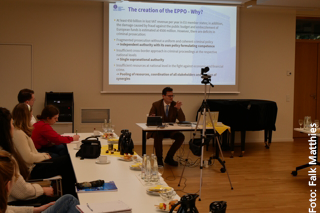Am 23. Januar 2023 hielt Andrés Ritter, German European Prosecutor und Deputy European Chief Prosecutor, European Public Prosecutor's Office, einen Gastvortrag zu dem Thema „The European Public Prosecutors Office – Background of the first supranational prosecutor's office and its relevance in the fight against organised crime“ im Rahmen der Gesprächsreihe Internationales Strafrecht. Die englischsprachige Veranstaltung war zudem Teil des Kollaborationsprojekts "Transnational Organised Crime: Organised Crime, Criminal Procedure, and Prisons" der Universitäten Queensland (Brisbane, Australien), Wien (Österreich), Zürich (Schweiz), Ferrara (Italien) und der Universität zu Köln. Im Rahmen des Projektes wird zur grenzüberschreitenden organisierten Kriminalität geforscht.
---
On 23 January 2023, Andrés Ritter, the German European Prosecutor and Deputy European Chief Prosecutor at the European Public Prosecutor's Office (EPPO) in Luxembourg, visited the Institute for Comparative Criminal Law. In the premises of the Cologne International Forum, Mr. Ritter delivered a lecture as part of the Institute's talk series on international criminal law. The lecture was simultaneously an event within the collaborative project "Transnational Organised Crime: Organised Crime, Criminal Procedure, and Prisons" of the Universities of Queensland (Australia), Ferrara (Italy), Vienna (Austria), Zurich (Switzerland) and Cologne, in which research is conducted on transnational organised crime.
"The European Public Prosecutors Office – Background of the first supranational prosecutor's office and its relevance in the fight against organised crime" was the title of Mr. Ritter's presentation. After some welcoming words and a brief introduction into the topic by Prof. Dr. Weisser, Mr. Ritter started his lecture with an introduction to the history, competences, structure and role of the EPPO. A special emphasis was placed on the challenges the EPPO has faced and still faces since the idea was first proposed in 1995 - opposition from member states and non-harmonised national law to name a few. In the main part of his talk, Mr. Ritter gave an in-depth insight into the daily work of the EPPO and the special role it plays in the fight against transnational organised crime to the detriment of the European Union’s financial interests. The captivating lecture was enriched by numerous highly topical anecdotes Mr. Ritter shared about the operational reality of the EPPO.
Before the event progressed into a lively discussion, Mr. Ritter outlined some perspectives being discussed for the future of the EPPO, such as an expansion of the competences to other fields of crime such as the prosecution of transnational terrorism, transnational environmental crimes and international cybercrime but also the presently debated issue of the offence of circumventing sanctions imposed by the EU.
In the discussion that followed, the audience had the opportunity to delve deeper into what had been presented and beyond. Contributions ranged from fundamental questions about the role of the EPPO and the collaboration with national prosecution authorities to highly specific legal aspects of the work of the EPPO such as the competent judge for investigative measures in cases concerning multiple member states.
Bericht von Jonathan Macziola, Institut für ausländisches und internationales Strafrecht
Für Rückfragen zur Gesprächsreihe Internationales Strafrecht wenden Sie sich bitte an: / For further information on the talk series on international criminal law, please contact: internationales-strafrechtuni-koeln.de
